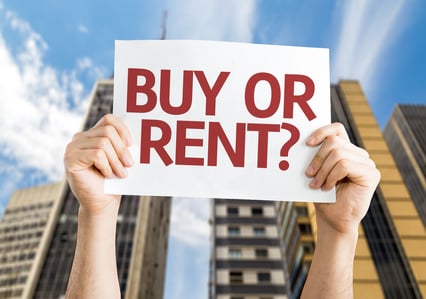 Have you ever wondered if it’s better to buy or lease a copier? This is a question we hear most often from our customers, and the answer is not as cut and dry as you may think.
Have you ever wondered if it’s better to buy or lease a copier? This is a question we hear most often from our customers, and the answer is not as cut and dry as you may think.
Historically, when copiers just performed the simple function of copying, about half of all business owners leased their equipment while the other half bought it outright.
Today, more customers are leasing to get a little more bang for their buck with less strings attached. Unlike before, the final cost of a copier has gone up because of all of the add-on options that enhance productivity — such as software, in-line finishers, and expanded hard drives for document scanning, just to name a few.
 Ultimately, buying or leasing a copier is a lot like the decision you make when you buy or lease a vehicle—both are significant investments. In the end, it really depends on YOU—the driver/the user/the owner, and how you intend to use, and especially care for, the equipment.
Ultimately, buying or leasing a copier is a lot like the decision you make when you buy or lease a vehicle—both are significant investments. In the end, it really depends on YOU—the driver/the user/the owner, and how you intend to use, and especially care for, the equipment.
Maintenance - Love It or Leave It
Like a vehicle, a copier will need regularly scheduled maintenance throughout it’s equipment life. These “soft maintenance costs” can sometimes be added into a monthly lease payment so you're not faced with unpredictable charges when something breaks down. On the other hand, having a sense of ownership sometimes causes owners to take better care of their equipment than if they were leasing. How invested are you in the general upkeep of your copier?
Consider the Cost
Like a car purchase, buying a copier outright may seem like the smart thing to do if you have the money in hand, you want to save on interest payments, and you want to remain debt-free. Yet, if the fate of your company changes down the road, you may need that capital for something else, such as renovations or marketing, so leasing might make more sense for you.
Financing is also something to consider. When you lease, your rate is fixed, unlike some conventional loans you may consider. With a lease, no matter what happens with the economy, you know your lease payment will remain the same. Even when your contractual lease term is over, there are flexible end of lease options, and some agreements even have a $1 buyout clause. So for just $1, the machine is yours after your last lease payment. Many times, if the equipment is still in good working condition, many companies decide to keep the machine and repurpose it in another area of their organization.
Technology Limitations
If you have a set budget to work with, buying can sometimes put you in a corner. With a limited amount of money in hand, you may not be able to afford the exact model you’d like, meaning you may have to settle for older technology or refurbished equipment. With a lease agreement, acquiring newer and possibly more expensive technology can be more affordable by stretching out the payments over a longer period of time.
Flexible Financing
Office equipment technology changes so rapidly that buying isn’t as attractive as it once was. No one wants to be tied to an old piece of equipment that is no longer doing what they need. With a lease, the lessee has greater flexibility. Even if you’re in the middle of your lease, and you decide you want something new, you can make changes to the agreement and most times keep the lease payment exactly the same.
However you acquire your equipment, you have to know you — what are you most comfortable with? What can you afford now and into the future of your business and the operation of the equipment?
Weigh the pros and cons of both acquisition options and if you do lease, don’t forget to do your homework on the leasing company. Like we said before, there is no right or wrong way to acquire equipment.
To learn more about flexible, in-house financing options from Benchmark, including all-in-one billing and Easy Pay, contact us today.

